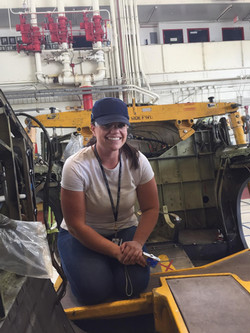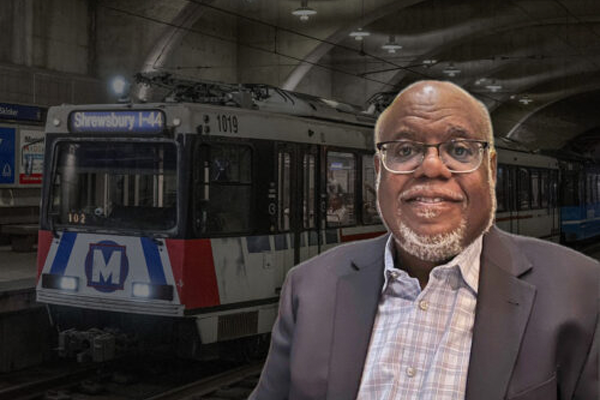Preparing for take off
Alumna Jenelle Cooper brings a lifelong love of aviation to her career as an aerospace engineer

Childhood entertainment led Jenelle Cooper, MSME ’12, to the aerospace engineering industry. “I grew up near a private airfield, and my parents would often take me and my brother over there to play outside,” says Cooper, now an aerospace engineer and team manager at Boeing. “We’d watch the planes take off and land, and we just thought it was the coolest thing. It was an inexpensive way for my parents to entertain us, and it sparked my love of airplanes.”
Growing up, some of Cooper’s family vacations included a stop in Huntsville, Alabama, to visit NASA’s Marshall Space Flight Center, which furthered her interest in the industry. With her love of math, science and airplanes, she decided to study aerospace engineering.
Cooper earned a bachelor’s degree from Saint Louis University and then accepted a position at Boeing, where she worked as a structural analysis engineer on the F/A-18 Super Hornet, analyzing ways to make parts better and more cost-efficient. After a year on the job, she decided to pursue a master’s degree in mechanical engineering with an emphasis on materials science at the McKelvey School of Engineering.
“So many Boeing employees attend WashU for their graduate degrees, and it seemed like a natural fit for me,” Cooper says. “My professors were great at tying course content to practical applications I could use in my job.”
In addition to the knowledge she was gaining through coursework, Cooper was learning a lot about aircraft build and redesign in her ongoing structural analysis role at Boeing. Then she had the opportunity to present to the client: the U.S. Navy. “I loved interacting with the customer and hearing their feedback on the product,” she says. “It put into perspective that what we were doing as engineers really mattered.”
Cooper’s positive experience with the Navy led her to pursue a new role as a technical integrator, where she served as the liaison between the customer and the engineering team. After a few years, she wanted a new challenge and made the switch to a systems engineer role working on two military aircraft, the AV-8B Harrier and T-45 Goshawk. The T-45 is a trainer aircraft flown by the Navy that can take off and land on an aircraft carrier, and the Marine Corp’s AV-8B can perform vertical takeoff and landing.
“Aircraft are designed to withstand a certain amount of flight hours, and the customer often wants to extend the life of the aircraft,” she says. “It takes major analysis to see if the parts can withstand an extra 5,000 flight hours, for example. If not, we figure out how we’ll need to fix them to be able to do that.”
After more than three years in the systems engineer role, Cooper was promoted to chief engineer of both the T-45 and the AV-8B. Then, in late 2022, she accepted her current role as manager of the systems engineering team.
The T-45 and AV-8B platforms are going through sundown processes and will retire in the coming years. So what’s Cooper’s next move? She enjoys coaching her team of nine and hopes to continue in management, possibly working on flight tests for a brand-new aircraft.
Her advice for others interested in engineering? “Just go for it, because you never know until you try,” Cooper says. “I’ve had conversations with people who are interested in engineering but feel they aren’t great at math, so they don’t think it’s the right path for them. If you’re creative and you have critical thinking skills, you can work through anything with the help of professors and other students. Engineering is not a solo act — we’re working as a team to develop solutions.”




